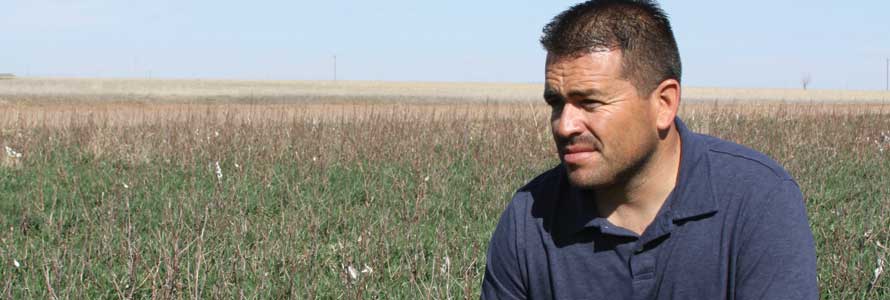The Secret to Successful Farming
Trisha Williams

It is just past dawn, and the fierce Texas sun is already bearing down on the thirsty fields. Without a second thought, Greg Chavez does something he would consider as natural as breathing. He prays for rain.
Chavez was born in Chihuahua, Mexico. When he was a two-year-old, his family left their home country to find a more prosperous life in the U.S. Chavez" father bought some land and began what soon became a family tradition.
Chavez was raised on a family farm just west of Hereford, Texas. His childhood was encompassed by soft white bolls of cotton, the fresh earthy scent of tilled soil, and golden oceans of wheat, corn and hay.
Chavez said he always knew he would follow in his father"s footsteps by embracing his love for the land and doing his best to grow high-quality crops in the most efficient way he could manage.
"For as long as I can remember," Chavez said, "I don"t think I have ever wanted to do anything else."
Chavez and his father are in a partnership where they own and operate approximately 3,500 acres of farmland across Deaf Smith County. A portion of this land is the same land where Chavez grew up.
Chavez utilizes a crop rotation system that involves producing corn, cotton, wheat and hay. He also runs cattle on a portion of the land. However, as most agriculturalists would agree, the journey to becoming a successful farmer is far from easy, and the case was no different for Chavez and his family.
"It is a rewarding occupation," Chavez said, "But, there may be years when it is very challenging."
In recent years, Texas and other states have been plagued by severe heat and rapid evaporation. On top of this, insufficient rainfall has allowed destructive wildfires to blaze across the land. According to the online U.S. Drought Monitor for February 2012, only a meek 6.05 percent of Texas is not currently affected by some level of drought. Perhaps more shocking, 13.93 percent of the state is classified as a D4, which is the most extreme form of drought categorized.
"The hot dry weather we had and excessive drought," Chavez said, "is definitely going to change the way we run our farm."
In an effort to increase productivity, Chavez has enlisted the help of his local USDA Natural Resource Conservation Service office to improve his irrigation practices. Though Chavez has been utilizing NRCS services for more than 10 years now, he continues to seek improvement for his operation and irrigation water management (IWM) through the Environmental Quality Incentives Program (EQIP), the Agricultural Water Enhancement Program (AWEP), and most recently, a program specifically for Historically Underserved or Socially Disadvantaged Farmers.
"I didn"t know too much of what to expect when I first went to NRCS," Chavez said. "But, the people there were really helpful and knowledgeable."
As stated on the USDA-NRCS website, EQIP is a voluntary program that provides financial and technical assistance to agricultural producers. Similarly, AWEP is a voluntary conservation initiative that provides financial and technical assistance to agricultural producers. It implements agricultural water enhancement activities to conserve surface and ground water to improve water quality.
"NRCS has helped a lot with making my operation more efficient with my time and my resources," Chavez said.
Chavez said he has been able to get more use out of each drop by delivering the water to the crops more efficiently, which reduces runoff and evaporation. He has had leaky underground lines replaced, old pivots repaired and new pivots installed. He is currently working toward switching to drip irrigation on a portion of his land by applying as a Historically Underserved or Socially Disadvantaged producer.
With the help of NRCS, Chavez had chemigation valves placed on pivots to assist in protecting ground water. Additionally, Chavez utilizes a nutrient management system and uses state of the art pest management equipment.
Mike White, resource team leader and district conservationist in Hereford, Texas, has assisted Chavez in making his operation more efficient over the years.
"All of the practices Chavez utilizes are designed to maximize production," White said, "and provide a water quality safety net."
White said he encourages all producers to evaluate their individual situations and seek help through NRCS in order to make their operations as efficient as possible.
Chavez said he appreciates the assistance offered through NRCS, and he hopes that his son Michael, who is currently 10 years old, will someday join the family legacy and continue to work diligently in contributing to the world"s food supply. He said he is aware he has chosen a challenging lifestyle, but Chavez believes he has found the secret to successful farming.
"Consistency, commitment, and a lot of prayer," Chavez said, "most of all prayer."







